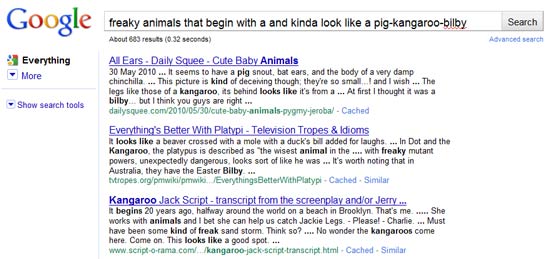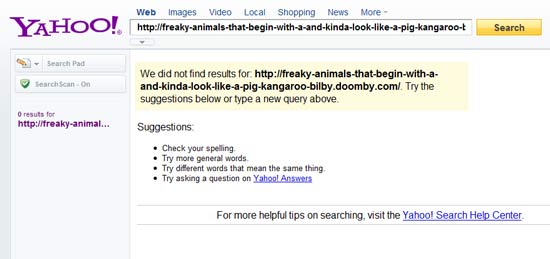What's a search engine anyway?
The internet is a very big place – think Alaska big, not Big Ben big. It's filled with billions of pages, and millions more are added every day. Now try to imagine all those pages are sitting in drawers of a (very big) filing cabinet. When you need to find a page, it's going to be a lot easier if you know which drawer it's in, but frankly, even then your chances of finding it in a hurry are pretty slim. Fortunately, there's an index that lists all of those pages, ordered not only alphabetically but also semantically. Because the index classifies pages in different ways, you can find the “aardvark” page under “a”, or under “animals”, “things with strange names” or even “mutant pig-a-roos”. Thanks to the index, all you need do is look under the right heading to find the exact location of the page you're looking for.
Search engines are just very big indexes, that order web pages under a lot of different headings to help you find the exact page you want, when you want it.
Unfortunately search engines aren't perfect, and sometimes when you type “freaky looking pig-a-roo” as a search term, you don't get what you're looking for (a page about aardvarks). That's because search engine indexes have their limits, and can't take into account every single term imaginable for every single subject or page. They can only return a list of results based on what they have been “programmed” to detect as relevant search terms for a given site (the end result of their treatment of the page, when processed by their search algorithm). Though they “learn” to associate new terms with existing sites, there are a lot of things you can do as a webmaster to help them “know” what terms are relevant for your site – more on that a little later on.

Why isn't my site showing up on (insert search engine name), even though it's been online for over an hour already?
It can be a little frustrating – you've finally made the decision to make your own website, and have been hard at work since publishing your very first page an hour earlier. Yet when you head to Google to see if people can “find” your website if they don't have the address (or URL, like your-website.doomby.com), there's nothing there. If you find yourself in this situation, just remember: the internet is a very big place – Alaska big, not Big Ben big - remember? Try to picture yourself standing on the beach in Barrow, and trying to see a page plastered to the side of the control tower at Anchorage airport. You're not going to see it, any more than Google is going to see your webpage an hour after it's published. Google “finds” new content by “crawling” around the internet – it's such a big job that it can't possibly notice every single change every single time something changes. It'll eventually “stumble” upon your site, and add you pages to its index. But it might take a day, a week, or even several weeks until that happens.

What can I do to make search engines notice my new website?
If you want to help search engines list your website in their indexes, you can “invite” them to visit it through a site submission. Submitting your website to search engines is a great place to start working on getting visitors to your new website - getting your site indexed by search engines as quickly as possible means visitors have a way of “finding” your site. You can submit your website to Google here, and to Bing and Yahoo over this way.
Your site won't appear in search engine results the instant you've submitted it; a site submission is only an invitation to the engine to visit your site. Fortunately, it's an invitation they won't refuse, and - just as soon as they have the time - the search engine “robots” (or “spiders”) will come and crawl around your site, take a look at your pages, and decide just where to add your site in the index (and for which terms).
We'll take a closer look at just how search engines go about choosing what terms to associate with your site next time. But for now, if you're just starting out and haven't already done so, why not take a break from your website creation - and get a head start on getting visitors to your site - by spending a few minutes on your site submission.
 We've often discussed the importance of SEO techniques when you make a website. We've seen, for example, how you can use the website builder tools that are part of doomby's free website maker to help optimize your website for search engine results. Today, we're going to get back to basics and answer some of the questions beginner webmasters often ask.
We've often discussed the importance of SEO techniques when you make a website. We've seen, for example, how you can use the website builder tools that are part of doomby's free website maker to help optimize your website for search engine results. Today, we're going to get back to basics and answer some of the questions beginner webmasters often ask.
